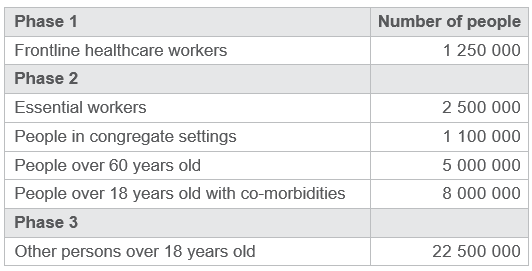Update on South Africa's vaccine roll-out plan
The January MediBrief provided you with our first information on Covid-19 vaccines. We explained, among others things, how vaccines are developed, tested and imported; what we then knew about the government's roll-out strategy; and confirmed vaccine funding for AMS members and dependants.
Slightly delayed kick off
We are fortunate to have world-class scientists in South Africa. They were at the forefront of discovering new mutations of the Covid-19 virus last year and the first to alert the WHO and other countries. They also exposed, just in time, that the AstraZeneca vaccine had less efficacy to protect against our local variant of the virus. While this first seemed like a disappointment or failure of the vaccination roll out, it reminded us that the development and testing of new vaccines can't be rushed. It needs a certain scientific process and time to ensure a safe and efficient roll out. It is reassuring to know that this process was still followed diligently in the background, while other, more noticeable preparations were underway. Government reacted within days, secured new vaccines and adjusted the roll out plan with only a slightly delayed kick off.
Who can get vaccinated and in which phase of the vaccine roll-out plan?
Phase 1 - in progress
Everybody wanting to be vaccinated may be vaccinated. Most - if not all - countries that have started their vaccination programs have prioritized high-risk groups. It is easy to understand; without doctors, nurses and other healthcare workers at the coalface, we have no chance of beating Covid-19. We hope you agree, these critical workers must be the first vaccinated, followed by others in the healthcare industry. Healthcare workers have already registered themselves on the Electronic Vaccination Data System (EVDS) to receive their vaccines. This platform will be made available to all people as Phase 2 and 3 are rolled out.
Phase 2 - we believe is expected to begin from May (depending on logistics and availability of vaccines).
Essential workers as well as people deemed vital to maintaining critical infrastructure and services to the country will be vaccinated in Phase 2. These are police officers, miners, teachers, people working in security, retail, food, the funeral industry, banking, taxi drivers and essential municipal and home affairs personnel, border control and port health services. Phase 2 also includes people in congregate settings which means those individuals in care and old age homes, detention centres, shelters and prisons, and those in the tourism industry and educational institutions. People over 60 as well as those over 18 with comorbidities will also be able to receive their vaccine in Phase 2. For people between 18 and 60, the qualifying co-morbidities are: living with uncontrolled diabetes, chronic lung disease, poorly controlled cardiovascular disease, renal disease, HIV, tuberculosis and obesity.
Phase 3
Other persons over 18 years old that are not listed above will be able to get their vaccine in Phase 3.
Estimated numbers of people required to be vaccinated to obtain herd immunity

How do we reach herd immunity?
While President Cyril Ramaphosa declared that nobody will be forced to be vaccinated, vaccinating as many people as possible, as fast as possible, means more lives can be saved. It also means a potentially quicker return to a more normal life. Local scientists estimate that 67% of the population - about 40 million people - need to be vaccinated to reach herd immunity. At the date of compiling this MediBrief, government had already secured enough doses from different suppliers, the WHO's COVAX scheme and through the African Union, and was still negotiating additional supplies to achieve this goal.
Commendable collaboration in the spirit of solidarity
Many South African Businesses, through Business Unity South Africa (BUSA), have actively supported, provided funding and/or offered resources and education. Anglo American, with its decades of involvement in major public health programmes, allocated R150 million to vaccinations in South Africa (R450 million globally) which includes assistance through its staff and healthcare operations. Other mining companies offered facilities and donated staff time. MTN donated 7 million vaccines to African countries.
Discovery Health executives (our administrator), are involved in the government-led vaccine roll-out program through the Business for South Africa's Steering Committee. Discovery's Adrian Gore chairs the vaccine-acquisition task team to assist the country in pooling additional financial resources to purchase available vaccines. Each medical scheme member will get their vaccine free of charge at the point of service. The cost, which will include a percentage to assist uninsured members, will be paid by schemes to providers who will pay it back to government. Everybody will be involved.
Please remember that this is, and must be, a global effort. No country has achieved the desired vaccination target yet as no country has purchased enough vaccines. Manufacturers are working day and night to produce the doses required to vaccinate this entire planet. It does not help if only 'this' country, 'that' employer or 'my' segment of the population is vaccinated. For this to work, all hands must be on deck to fairly distribute vaccines - according to global and national risk groups and priorities.
You would have received an invitation from AMS to participate in a survey, conducted by the Council for Medical Schemes. The objective of the survey is to determine members' views about Covid-19 vaccines. The results will assist us in planning and communicating the topic. Participation is voluntary and you will not need to provide any personal information. If you haven't completed the survey as yet, we encourage you to do so.
Published: February 2021